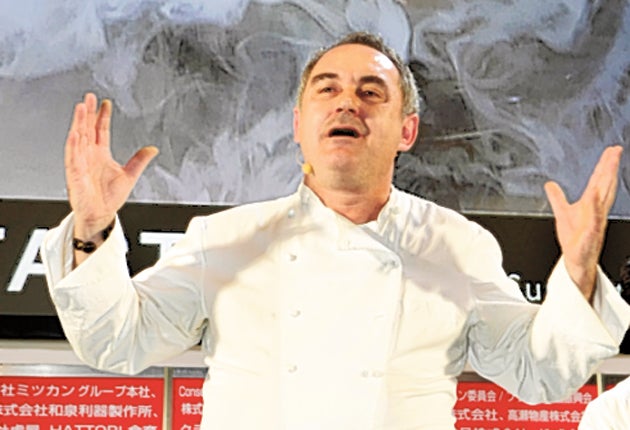News alert: Adrià has made cantaloupe caviar
El Bulli chef is back in the kitchen thanks to novel deal with Spanish telecoms company

Your support helps us to tell the story
From reproductive rights to climate change to Big Tech, The Independent is on the ground when the story is developing. Whether it's investigating the financials of Elon Musk's pro-Trump PAC or producing our latest documentary, 'The A Word', which shines a light on the American women fighting for reproductive rights, we know how important it is to parse out the facts from the messaging.
At such a critical moment in US history, we need reporters on the ground. Your donation allows us to keep sending journalists to speak to both sides of the story.
The Independent is trusted by Americans across the entire political spectrum. And unlike many other quality news outlets, we choose not to lock Americans out of our reporting and analysis with paywalls. We believe quality journalism should be available to everyone, paid for by those who can afford it.
Your support makes all the difference.Ferran Adrià, the Catalan chef who gave the world cantaloupe caviar, the deconstructed Spanish tortilla and quail eggs caramel-coated with a blowtorch, has moved a step closer to turning his Michelin-starred restaurant, El Bulli, into a non-profit research foundation.
To some observers, the project seemed as improbable as freezing foie gras into noodles with liquid nitrogen, one of his many techniques that revolutionised the world's gourmet kitchens.
But the creative cuisine guru has reached a deal with the Spanish telecommunications giant, Telefónica, to sponsor the conversion of his waiting list-only restaurant on the Costa Brava into a "think-tank" of avant-garde gastronomy that will transmit the breaking news of its edible experiments via internet "minute by minute". It is expected to open in 2014.
"Today is really the start of the new El Bulli," the chef, 47, said after signing the agreement after four months of negotiations. "This is the confirmation of a project some were sceptical about. Now they know we are creating something big, something unique."
Does that mean web surfers will soon be treated to three-dimensional images of "spherified" olive oil? Probably not. "We want to transmit knowledge, not create a show," Mr Adrià said.
Foodies around the world dropped their foam-filled forks earlier this year when the renowned chef announced that he would shut El Bulli in 2011 to launch this highbrow scheme.
The restaurant near Gerona, which has on five occasions been voted the world's best by connoisseurs at Restaurant magazine, had become a pilgrimage site. The lucky few who landed reservations would savour a tasting menu of 30 courses, created with techniques borrowed from science and industry, for more than €200 (£175) per person. The place closed six months a year so that Mr Adrià and his disciples could experiment in peace.
Over the past two decades, the El Bulli kitchen has spawned a generation of young, daring chefs who have brought surprising ingredients and magician-like cooking techniques to practically every city in Spain and many small villages, too.
After 2011, however, El Bulli will cease to operate as a restaurant at all. Instead, it will become a foodie foundation led by an "in-house creative team" and at least 20 visiting chefs, awarded yearly scholarships.
It will collaborate with other artistic disciplines and disseminate discoveries in culinary circuits. One of its missions is to create a "great encyclopaedia of contemporary cuisine". The one thing it will not be, Mr Adrià insists, is a school.
"The El Bulli Foundation will be a foundation for all avant-garde gastronomy lovers: chefs, sommeliers, front-of-the-house professionals, gourmets, creative thinkers or solely enthusiasts of our dream," said a statement on the El Bulli website. "It will be a breeding ground for new ideas."
Despite its international reputation, El Bulli, like many top-ranked eateries, loses money – reportedly €500,000 (£437,000) a year. Until now, Mr Adrià has managed to supplant the losses with side businesses and marketing agreements, including a luxury hotel near Seville, his own crockery brand and a "healthful fast-food" chain.
The non-profit think-tank is also in keeping with Mr Adrià's intellectual spirit. The inventor of molecular gastronomy has always aspired to elevate food preparation to the status of a fine art, comfortably above the din of dropped cutlery and customers pushing back their chairs.
In fact, he was invited earlier this year to participate in Germany's "Documenta" arts festival – as an artist. He is fond of philosophising, and even distilled his musing into the 23 culinary "commandments".
"Harmony is to be found in small servings," reads commandment 20. "All products have the same gastronomic value, regardless of their price," the third commandment reads.
Irony in food is, fortunately, allowed – but only if it is "closely bound up with the process of gastronomic reflection".
Join our commenting forum
Join thought-provoking conversations, follow other Independent readers and see their replies
Comments